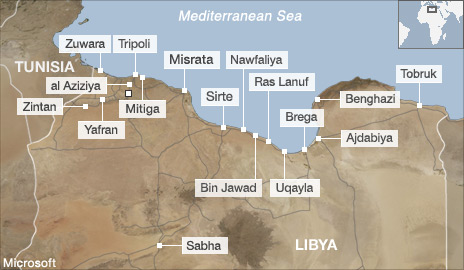 Several European governments urged their citizens to evacuate the eastern Libyan city of Benghazi in response to what the U.K. described as “a specific and imminent threat to Westerners,” highlighting jitters in the region after last week’s deadly hostage siege at a natural-gas facility in Algeria.
Several European governments urged their citizens to evacuate the eastern Libyan city of Benghazi in response to what the U.K. described as “a specific and imminent threat to Westerners,” highlighting jitters in the region after last week’s deadly hostage siege at a natural-gas facility in Algeria.
The U.K. Foreign Office didn’t provide further detail as to the nature of the threat in Benghazi. The U.K., like the U.S., had advised its nationals against all travel to the city after the Sept. 11, 2012, attacks on the U.S. Consulate in Benghazi, which killed four Americans, including the ambassador to Libya.
The Foreign Office, in its alert Thursday, advised any British nationals who remain to leave immediately. Germany and the Netherlands later also urged their citizens to leave the Libyan city.
The U.S. reiterated a previous warning against all travel to Benghazi.
“Although there is no specific information pointing to specific, imminent threats against U.S. citizens, the potential for violence and kidnappings targeting Westerners in Benghazi is significant,” the State Department said following the British warning on Thursday.
The warnings come a day after a long-awaited appearance by Secretary of State Hillary Clinton in Congress, where she defended the Obama administration’s handling of the attack last year in Benghazi and faced off against critics who said the U.S. hadn’t provided adequate security there.
Following the attack, the U.S. evacuated all government officials and contractors from the city.
The threat in Benghazi appeared to be related to Islamist extremists, according to a person in the British government, who said the number of British citizens in Benghazi was in the dozens.
The Libyan government said Wednesday it was boosting security at its oil fields in response to the Algerian attack. Many of the country’s oil and gas exploration and production sites are located in the sparsely populated deserts of western Libya, near the Algerian border.
Several regional experts have highlighted Libya’s oil industry—where oil companies such as the U.K.’s BP BP.LN -0.79% PLC, U.S.-based ConocoPhillips COP +1.42% and Italy’s Eni SpA ENI.MI -0.72% operate—as one of the most likely targets of a terrorist attack following the Algerian incident. BP, one of the foreign operators of the Algeria site attacked last week, said it has no staff in Benghazi.
At least 37 foreigners were killed during the four-day siege in Algeria, about 18 miles from Libya’s western border. The Islamist militant group that claimed responsibility said it staged the attack in response to France’s deployment of troops to help African forces fight al Qaeda affiliates in Mali. The U.K., U.S. and Canada have provided cargo planes to support the French effort, and the U.S. is considering further assistance, officials said.
Algerian officials blamed the attack on affiliates of al Qaeda in the Islamic Maghreb, or AQIM, which uses northern Mali as an operating base.
AQIM and related groups have spread across an expanse of Africa from Mauritania to Chad, in a range of groupings and criminal gangs involved in terrorist attacks, smuggling, kidnappings and other activities.
Following the toppling of dictator Moammar Gadhafi in 2011, experts say Libya has suffered from lax security.
From 2008 to last week’s Algeria incident, AQIM and related groups had taken more than 25 hostages of a variety of nationalities, primarily European, according to the British government. A British citizen was among a group of tourists who were kidnapped in Mali in January 2009. He was killed some months later.
WSJ

Leave a Reply
You must be logged in to post a comment.